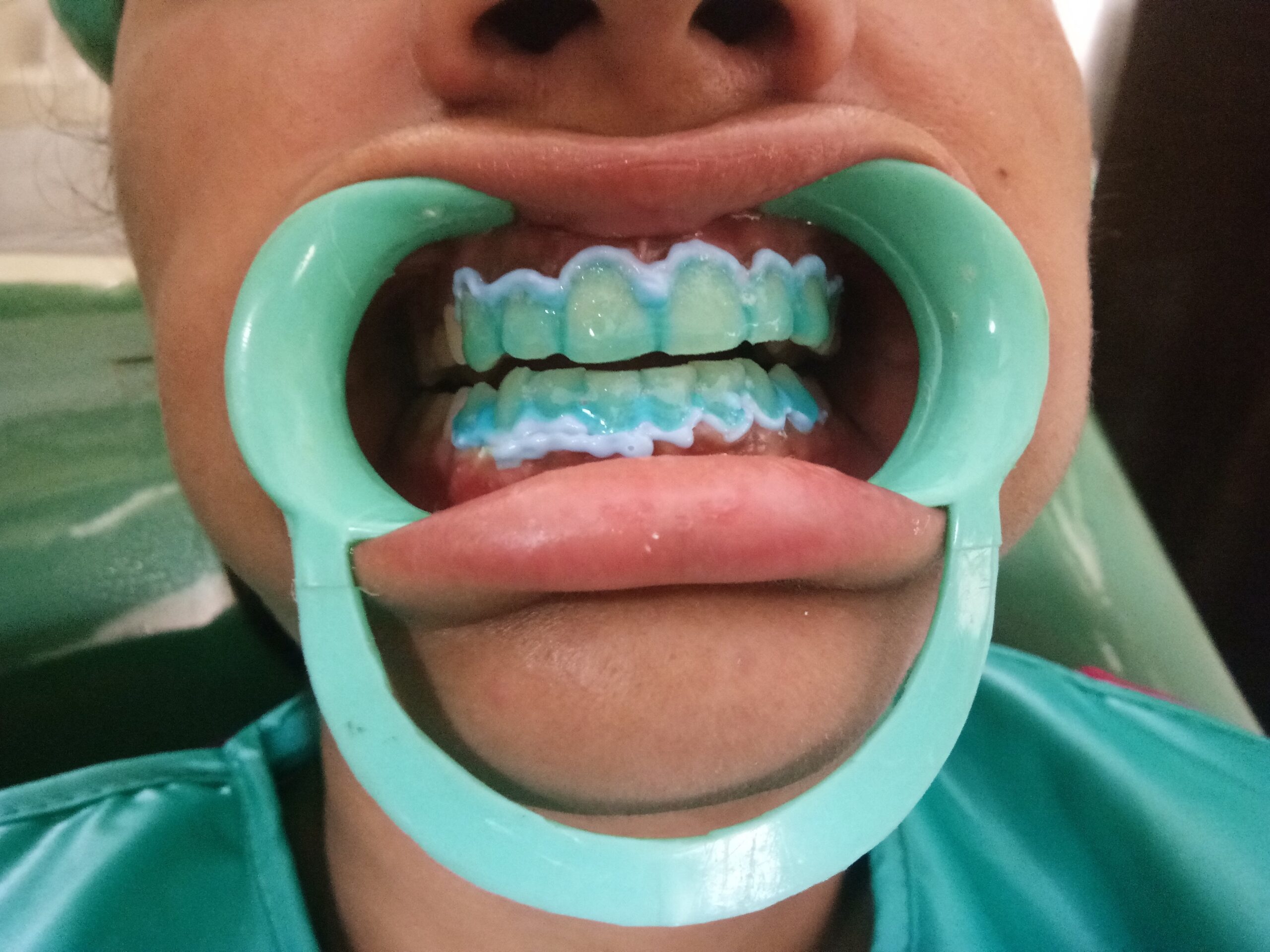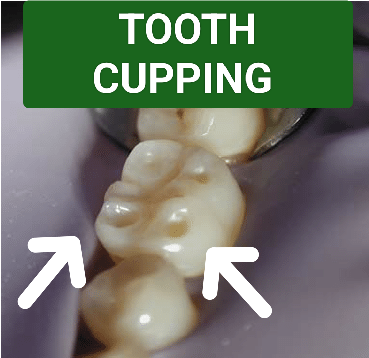What Is Tooth Whitening?
The most asked question after tooth whitening is “How To Get Rid Of Sensitivity After Whitening”?
Teeth whitening is a cosmetic dental treatment that involves the use of bleaching agents to remove stains and discoloration from teeth. It is a safe and effective procedure that can lighten the color of natural teeth by several shades. Teeth whitening does not change the shape or structure of teeth but simply improves their appearance.
Related Article:- TEETH WHITENING OR LIGHTENING
So Let’s Understand Why do teeth become sensitive after tooth lightening or whitening.
Teeth whitening agents work by penetrating the enamel (the outer layer of teeth) and breaking down the stains that have formed inside the tooth. The bleaching agents usually contain hydrogen peroxide or carbamide peroxide, which release oxygen molecules that penetrate the enamel and break down the stains.
Teeth whitening is generally safe when done correctly and under the supervision of a dental professional. Most side effects are mild and temporary, such as tooth sensitivity or gum irritation, and can be easily managed. However, some risks come with any dental procedures, such as damaging the enamel or worsening existing dental problems.
Tooth sensitivity after whitening or bleaching is a common issue that some people may experience. The main reasons for this sensitivity are the removal of the tooth’s protective layer (enamel) during whitening, and exposure of the underlying dentin layer. The dentin layer contains microscopic tubules that lead to the nerve endings in the tooth, which then leads to sensitivity.
Related Article:- TEETH WHITENING OR LIGHTENING
How To Fix Tooth Sensitivity After Tooth Whitening?
Tooth sensitivity is a common side effect of teeth whitening/bleaching.
The following strategies can help alleviate this sensitivity:
1. Use desensitizing toothpaste:
Toothpaste containing potassium nitrate or strontium chloride can help reduce sensitivity. Use this toothpaste twice a day for at least two weeks before and after bleaching.
2. Use a fluoride gel:
Fluoride gel can help reduce the sensitivity. Apply it to your teeth for a few minutes, following the manufacturer’s instructions.
3. Use a sensitivity gel:
Apply sensitivity gels or other desensitizing agents provided by your dentist.
4. Avoid hot and cold food and drinks:
Foods and drinks at extreme temperatures can worsen sensitivity. Avoid them immediately after bleaching.
5. Find the right concentration:
Lower bleaching gel concentrations may reduce sensitivity. Discuss with your dentist the best concentration to reduce sensitivity.
6. Reduce treatment time:
Reduce the treatment time as directed by your dentist.
7. Consult your dentist:
If the sensitivity persists, contact your dentist. They may recommend other treatments like bonding or veneers.
What are The Home Remedies To Stop Tooth Sensitivity?
Here are some that can help alleviate tooth sensitivity at home:

1. Salt Water Rinse:
Mix a teaspoon of salt in a glass of warm water and swish it around in your mouth for 30 seconds before spitting it out. This will help reduce inflammation and sensitivity.
2. Coconut Oil Pulling:
Swish a tablespoon of coconut oil in your mouth for 15-20 minutes and spit it out. This will help reduce inflammation and protect the enamel from sensitivity.
3. Green Tea:
Sip a cup of green tea to soothe inflammation and reduce sensitivity.
4. Aloe Vera:

Apply some aloe vera gel to the sensitive teeth and leave it for a few minutes before rinsing your mouth with water. Aloe vera has anti-inflammatory properties that can relieve sensitivity.
5. Clove Oil:
Dip a cotton swab in clove oil and apply it to the sensitive area. Clove oil has natural numbing properties that can ease pain and sensitivity.
6. Avoid acidic foods and drinks:
Acidic foods and drinks can erode the enamel, making teeth more sensitive. Avoid consuming these foods and drinks, particularly after bleaching.
It’s important to keep in mind that these home remedies may reduce the symptoms of sensitivity but may not cure the underlying cause. If your sensitivity persists, it’s best to see a dentist for a proper diagnosis and treatment plan.
If the sensitivity persists, consult a dentist who can suggest the best course of treatment, such as fluoride treatment, bonding, or a gum graft.
FAQs
Q: Is it common to experience tooth sensitivity after teeth whitening?
A: Yes, tooth sensitivity is a common side effect of teeth whitening. This is because the whitening gel can penetrate the enamel and reach the nerves inside the tooth, causing temporary sensitivity.
Q: How long does tooth sensitivity last after teeth whitening?
A: Tooth sensitivity after teeth whitening usually lasts for a few days to a week. However, in some cases, it may last longer.
Q: What can I do to reduce tooth sensitivity after teeth whitening?
A: To reduce tooth sensitivity after teeth whitening, you can use desensitizing toothpaste, avoid hot and cold foods and drinks, and use a soft-bristled toothbrush. It is also important to avoid re-whitening for a few days to allow your teeth to recover.
Q: Can I still whiten my teeth if I have sensitive teeth?
A: It is still possible to whiten your teeth if you have sensitive teeth. However, you may need to use a lower concentration of whitening gel or consider using alternative whitening options such as natural remedies or over-the-counter whitening strips.
Q: Is it safe to whiten my teeth if I have sensitive teeth?
A: Whitening your teeth is generally safe if you have sensitive teeth, as long as you take the proper precautions and follow instructions carefully. However, you should talk to your dentist if you have any concerns or underlying dental issues.
Q: Will tooth sensitivity after teeth whitening go away on its own?
A: Yes, tooth sensitivity after teeth whitening will go away on its own as your teeth gradually adjust to the whitening treatment. However, using desensitizing toothpaste and avoiding hot and cold foods and drinks can help alleviate the discomfort in the meantime.





One thought on “How To Get Rid Of Tooth Sensitivity After Whitening?”